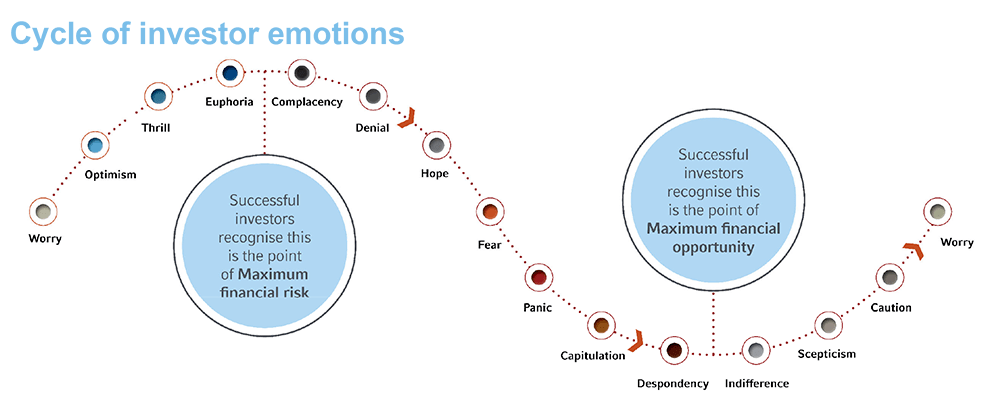09 Sep Thinkpiece
In this update:
-
- The cycle of investor emotions
The cycle of investor emotions
As regular subscribers will know on reading these posts, I have discussed the timing and nature of markets on a regular basis. Markets typically fall into either bull and bear phases.
For a definition of bull and bear markets, please read my Thinkpiece from 23 December 2022
When investing during challenging times like this, people start to question what they have done. They start to doubt themselves, and possibly their adviser and their financial plan if they have one.
So, what’s happening here is that they’re reacting to the current news and not looking through this, which is what markets do. Markets can turn very quickly indeed. In effect they are letting their emotions run the show.
The four most expensive words in the English language are,
‘This time it’s different.’
Sir John Templeton
They then feel that perhaps the grass is greener on the other side, and that maybe a new strategy would be best. They can then be tempted to ‘jump ship’ and change to ‘what’s currently working’. These impulses to change something can invariably cause the most destructive of harms to our long term financial wellbeing.
If you stand at a bus stop, eventually you’ll catch a bus. But if you run from bus stop to bus stop, you may never catch a bus.
Howard Marks
The cycle of investor emotions is illustrated below.

When financial markets experience an upward or downward spike it can be difficult to not get caught up in the hype. From attention-grabbing news headlines to predictions from industry economists – it seems everyone has a different opinion on what markets will do next, and the best action to take. But when it comes to your investments, we naturally question whether our strategy is right, but the best strategy is to remain focused on the long-term, and not be swayed by emotions.
Initially as investors, we all start with optimism. We commonly expect things to go our way and tend to expect a reward for the risk of investing.
As our expectations are met, we get excited about the possibility of even greater returns, and the excitement becomes thrilling as the returns exceed our expectations. We are at the top of the cycle when we experience euphoria. But it is at this point that we also experience maximum financial risk. When we believe everything that we touch turns to gold, we fool ourselves into believing that we can beat the market, that we cannot make mistakes, that excessive returns are commonplace, and that we can tolerate higher levels of risk.
This euphoria was experienced by many investors at the start of 2020, prior to the Covid-19 outbreak and subsequent economic fallout. Global stock markets were at all-time highs as a result of the longest bull market in history, and many investors expected this trend to continue.
The second phase of the cycle begins when the market stops meeting our new lofty expectations and begins to turn. At first, we anxiously watch the market for any signs of direction. Anxiety turns to denial and then to fear as the value of our investments decline. We start to act defensively and may think about switching out of riskier assets to more defensive investments such as bonds.
In the third phase of the cycle, the realities of a bear market come to the fore and we become desperate. People may panic and withdraw from the market altogether – afraid of further losses. Those who persevere become despondent and we wonder whether markets are ever going to recover, and whether we should be invested in them at all.
Every market presents opportunities, but these don’t perhaps seem apparent to the uninitiated or unseasoned investor.
Ironically, at these times, we commonly fail to recognize that we are actually at the point of maximum financial opportunity.
In bear markets, stocks return to their rightful owners.
J P Morgan
The five most common behavioural pitfalls are:
- Overconfidence
When investors overrate their ability to select winning shares or investment managers. - Loss aversion
Research indicates that a loss causes about twice as much pain as a gain causes pleasure. During periods of market volatility investors experience the sense of loss more acutely. - Chasing past performance
Unfortunately individual investors who abandon a well-diversified portfolio for bonds, or even cash, may be jeopardising their future financial security. - Timing the market
Research shows that no-one can accurately time the markets, identify in advance a winning sector, winning fund manager or winning country. Therefore we will never try to do this or claim to know how to do it. - Failure to rebalance
The risk/return characteristics of an investor’s portfolio should be independent of what’s happening in the market and this means selling high and buying low.The temptation to fall into one of these traps can be resisted by developing and committing to a well-defined, long-term investment policy. This is the best way to protect yourself from your emotions.
Take for example the American investor, Peter Lynch, who returned 29% annually between 1977 and 1990. That turned $10,000 into $260,000. Yet, during that amazing run, his fund dropped:
- 10%: 15 times
- 15%: 6 times
- 20%: 4 times
- 35%: 1 time
- AND was below its recent high more than 50% of the time.
So we must come to understand that volatility is normal, if we are not to overreact to the current crisis du jour.
We conclude that there is likely to be a continued period of volatility in global markets. We must therefore look beyond the ‘daily noise’ and consider the underlying fundamentals of our own investments. It is difficult to remember that the market can help us maintain and sustain our wealth over the long term, when we witness the challenges across the world that we see today.
There have and always will be significant uncertainties in the world – Ukraine, Russia, the Middle East, the EU, Africa, US domestic and international policy as well as our own political and economic agenda in the UK are always present. It could be said that ‘In times like these, it’s helpful to remember that there have always been times like these.’
The key with stock market volatility is not to over-react. Share prices will fall and rise and it’s important not to be ‘out of the market’ at the wrong time as this can be costly to your overall capital values.
A common mantra in investing circles is
“It’s about time in the markets, not timing the markets”.
In other words, the best way to make money is to stay invested for many years, rather than worrying about the best time to invest.
We believe investors should remain focused on the medium to long term, investing over ‘time’, rather than trying to ‘time the market’.
Ongoing management of one’s financial plan and investments remains important and generally volatility can be partially mitigated by diversifying investments suitably across a broad range of asset classes that include equities, fixed interest securities (bonds) and cash.
If you are a client, we will always look to ensure that you have investment portfolios that reflect your requirements, tailoring them to your attitude to risk and capacity for loss, whilst considering what the impact the current stage in the economic cycle has on your exposure to various assets.
So in essence, ensure that you have an appropriate financial plan drawn up with a qualified financial planner, and stick to the plan.
If you’ve not yet put in place a sound financial plan and you’d like to know more, please feel free to contact us on 01626 305318 or via email here.
The views expressed are not to be taken as financial advice. Professional advice should be sought before proceeding.



Sorry, the comment form is closed at this time.